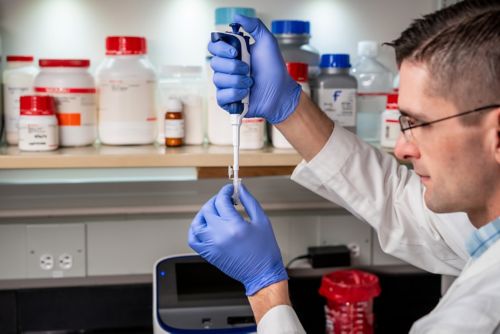St. Jude Family of Websites
Explore our cutting edge research, world-class patient care, career opportunities and more.
St. Jude Children's Research Hospital Home

- Fundraising
St. Jude Family of Websites
Explore our cutting edge research, world-class patient care, career opportunities and more.
St. Jude Children's Research Hospital Home

- Fundraising
Samuel W. Brady Lab
Investigating cancer genomics to understand cancer drug responsiveness
About the Brady Lab
There is a complex relationship between cancer therapies and cancer genomics. Mutations within cancer cells can lead to drug resistance and, subsequently, ineffective therapies. Some existing therapies may induce mutations, leading to secondary cancers later in life. Our laboratory is interested in identifying mutational signatures to understand how and why these events occur in patients. By combining genomic and pharmacology techniques, our work can help inform better treatment development and prevent future complications. Further, certain genomic alterations can promote drug responsiveness, and we seek to understand how to exploit these vulnerabilities in cancer.

Our research summary
The overarching objective within the Brady Lab is to improve cancer treatment and reduce toxicity using genomics as a starting point. Genomic alterations in a tumor can predict response or resistance to various therapeutics; our lab aims to understand why and how this occurs so that therapies can be tailored appropriately.
The team also uses mutational signatures to understand how existing therapies may induce secondary cancers in survivors later in life. Many pediatric cancer survivors will undergo treatment and be cured of their initial cancer but then develop a second cancer due to their prior therapy. Our lab uses mutational signatures and other genomic techniques to understand how therapy can induce specific mutations that initiate second cancers. The results of this work could help inform which therapies should be reduced to a lower dosage and which should be avoided entirely in certain patient populations. Therapy-induced mutational signatures can also fuel tumor heterogeneity and drug resistance. Thus, they may help identify approaches to sequence therapies so that highly mutagenic therapies are avoided during certain phases of therapy when drug resistance is more likely to develop.
Finally, we aim to tackle new therapeutic targets using existing or new therapies. Many current cancer therapies are toxic, which is a significant problem for pediatric patients because their bodies are still developing. In order to develop treatments that will have the maximum impact on cancer cells with minimal impact on healthy tissue, the team is working to identify the genes that are unnecessary for human survival but vital to a cancer cell’s survival. This research will allow the identification of existing drugs that can target the function of these genes or the development of new therapies to target specific proteins and minimize treatment toxicity.
Publications
Contact us
Samuel W. Brady, PhD
Assistant Member, St. Jude Faculty
Department of Pharmacy & Pharmaceutical Sciences
MS 313, Room I5308
St. Jude Children's Research Hospital
Follow Us

Memphis, TN, 38105-3678 USA GET DIRECTIONS